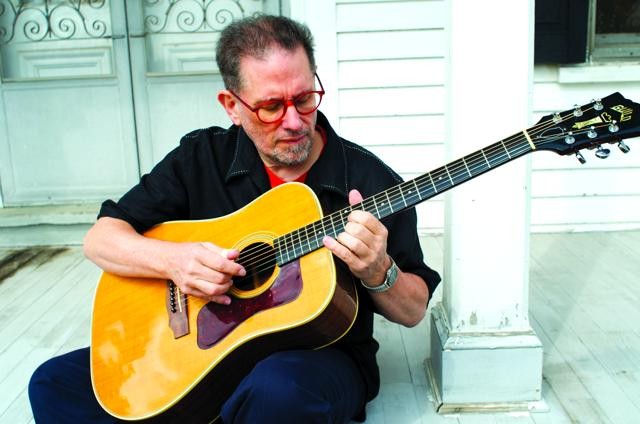Each of the five collections of stark acoustic picking attributed to Glenn Jones bares a similar cover. The motif is that of a different cute cartoon creature strumming away. On the front of his 2004 debut, it’s an oversized chick playing a guitar. Subsequent entries feature a beetle in a top hat, a fish lounging in a skiff and a kitten perched on a nighttime roof; each character plays absently in their respective scenes. My Garden State, Jones’ newest collection features a humanoid four-leaf clover playing banjo in the snow.
The covers are warm and welcoming, a promise of comfortable craftsmanship that Jones never fails to provide. But the bright and happy faces have often belied the melancholic hues that dominate his melodies. There are certainly dark shades on My Garden State, but it’s dominated by playful tunes and inviting textures, finally living up to Jones’ carefree taste in album covers. He attributes the new vibe in part to a challenging project he took on just before recording his new tunes.
“I’d been hired to play live music to the Buster Keaton silent film, Steamboat Bill Jr.,” Jones explains. “It’s got the famous scene with the house front falling, and [Keaton’s] standing in the window, so he’s not touched at all. I thought, ‘Well, this is a comedy, and my music is really kind of depressing.’”
Daunted, he turned to Laura Baird, one half of the crisp and primitive folk duo The Baird Sisters. Keying on her enthralling touch for clawhammer banjo and her light and lively sense of melody, he rehearsed with her for three weeks at her farmhouse in rural New Jersey, preparing material to accompany Keaton’s mischief. Their chemistry was immediate, inspiring him to return to her when it came time to record My Garden State.
Jones, now 59, returned to acoustic performance about 10 years ago after leading Cul de Sac, a manic post-rock outfit that sent violent verve ricocheting through claustrophobic arrangements. Since settling on solo work, his music has resounded with an uncommon sense of place, something that Jones accentuates by gracing his records with frequent field recordings culled from the areas where he has recorded. For instance, 2007’s Against Which the Sea Continually Beats, recorded during a stint on Martha’s Vineyard, includes snippets of boats in the island’s harbor and water lapping at the shore.
But place has never been more impactful to Jones’ music than it is on My Garden State. He wrote most of the songs at his childhood home in New Jersey, finding time to play as he helped care for his ailing mother. And while he didn’t go into the process intending to create a concept album, he says that the album’s mostly wistful mood has a lot to do with revisiting his old home and the memories housed within.
“That’s where I was living when I first got interested in music heavily, where I was living when I got my first guitar,” he says. “There was a cat, a dog, a hermit crab and mouse. There were all these family pets that lived and died there. There’s a lot of memory in the place. When I play these songs now, they have a little bit of a life of their own. Most people that write music have a little bit of an association with what they were thinking about and feeling when they wrote a song, and certainly, that’s true for me. It was just kind of a matter of thinking of the album as almost a visit to an old forgotten place.”
This bridging of past and present looms largest on “Across the Tappan Zee.” The winding banjo piece is named for the bridge over the Hudson River that Jones had to cross every time he made the trip back home. His picking strides purposefully in the song’s opening stretches before expanding into lively tumbles. One can’t help but envision Jones peering thoughtfully at the water and beyond.
Anchoring pieces on such concrete recollections is important for Jones. It helps him achieve the emotional immediacy that sets him apart from other acoustic pickers. But he hopes that these backstories aren’t necessary to enjoy his songs.
“If the music is going to speak to someone, the stories and the tunings and all that, it doesn’t matter,” he says. “If you want to get further into it via the liner notes or whatever else, that option is open to you, but hopefully it’s not a necessity to understand the music or to appreciate it.”
— Jordan Lawrence can be reached at jordan.f.lawrence@gmail.com.
who: Glenn Jones, with Shane Perlowin and Tashi Dorji
where: Apothecary, 39 S. Market St.
when: July 9 (8 p.m. doors/ 9 p.m. $10. ashevilleapothecary.info)






Before you comment
The comments section is here to provide a platform for civil dialogue on the issues we face together as a local community. Xpress is committed to offering this platform for all voices, but when the tone of the discussion gets nasty or strays off topic, we believe many people choose not to participate. Xpress editors are determined to moderate comments to ensure a constructive interchange is maintained. All comments judged not to be in keeping with the spirit of civil discourse will be removed and repeat violators will be banned. See here for our terms of service. Thank you for being part of this effort to promote respectful discussion.